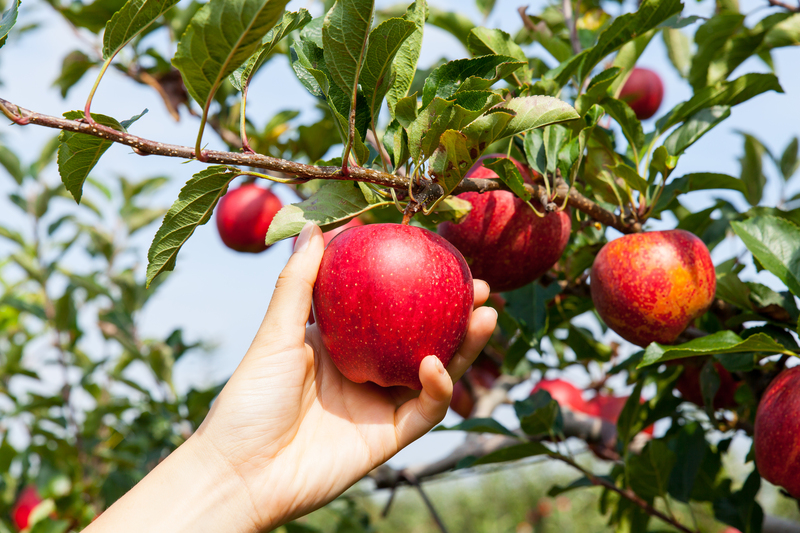Keeping Your Plants Alive and Well Through Winter
Posted on 30/06/2025
Keeping Your Plants Alive and Well Through Winter: Expert Tips for a Thriving Garden
Winter can be a challenging time for garden enthusiasts, but with the right strategies, you can keep your plants healthy and vibrant until spring returns. Whether you're a casual hobbyist or a seasoned gardener, ensuring your plants survive winter is key to enjoying a vigorous garden all year round.

Understanding How Winter Affects Your Plants
Before diving into how to keep your plants alive during winter, it's important to understand the seasonal challenges:
- Cold temperatures can damage plant tissues and roots.
- Frost may kill tender leaves and stems.
- Reduced light levels slow photosynthesis.
- Indoor heating can cause dryness and stress for houseplants.
- Water availability is often limited due to frozen soil.
Knowing these risks helps you take the right steps to protect your garden in winter and ensure every plant gets what it needs to thrive until warmer months arrive.
Preparing Your Outdoor Garden for Winter
1. Assess Your Plants: Know What Needs Protection
Not all plants are created equal when it comes to cold hardiness. Perennials, bulbs, shrubs, and trees all have different tolerance levels to low temperatures. Identify which species in your garden are most vulnerable to frost and snow so you can prioritize your efforts.
- Tender annuals often won't survive below freezing without intervention.
- Hardy perennials can usually handle moderate cold but may still benefit from extra care.
- Young trees and shrubs may need protection for the first few years.
2. Use Mulch to Insulate Roots
Applying a thick layer of mulch--such as straw, bark, or shredded leaves--around the base of your plants is a proven method for keeping roots insulated through winter. Mulch helps regulate soil temperature and moisture, reducing stress during freeze-thaw cycles.
- Apply 2-4 inches of mulch after the first hard frost but before the soil freezes solid.
- Keep mulch a few inches from the plant's stem to prevent rot.
3. Water Strategically - But Don't Overdo It
Plants need water even during winter, especially before the ground freezes. However, overwatering can lead to root rot, so balance is key.
- Water deeply in late autumn while the soil can still absorb moisture.
- Avoid watering frozen ground as roots can't absorb it.
- During winter thaws, check for dryness and water accordingly.
4. Protect Plants from Snow and Frost Damage
Snow acts as an insulator, but heavy accumulations can harm branches and stems. For delicate or upright plants, consider gently brushing off snow or using supports to prevent breakage. Burlap wraps or plant blankets can also offer protection from harsh winds and freezing nights.
Caring for Indoor Plants During Winter
1. Adjust Watering Schedules
During winter, most houseplants grow more slowly and require less water. Overwatering is a common mistake that leads to root rot. A simple rule: check soil moisture by inserting your finger about an inch deep--if it feels dry, it's time to water.
- Consider grouping plants together to create a microclimate of humidity.
- Use room-temperature water to avoid shocking roots.
- Ensure pots have good drainage.
2. Provide Adequate Light
Shorter days and less intense sunlight can stress indoor plants. Move light-loving species to sunnier windowsills, rotate them regularly to ensure all sides get light, or use LED grow lights for best results.
- Clean windows to maximize light transmission.
- Keep plants away from cold drafts and heat vents.
3. Maintain Humidity Levels
Heated homes can become extremely dry in winter, leading to browning leaf edges and plant stress. Boost humidity with these methods:
- Place a tray of water near your plants to evaporate and humidify the air.
- Group plants together or use a humidifier.
- Mist leaves occasionally--but avoid over-misting, which can promote fungal diseases.
4. Avoid Fertilizing Until Spring
Most houseplants go dormant or grow very little in winter and don't need extra nutrients. Hold off on fertilizing until growth resumes in spring to avoid fertilizer burn or unnecessary stress.
Specific Tips for Special Plant Types
Protecting Container and Potted Plants
Potted plants are more susceptible to cold damage since their roots are exposed. For keeping potted plants alive in winter:
- Move them to a sheltered location--such as a garage, shed, or indoors.
- Insulate pots with bubble wrap or burlap; use pot feet to elevate containers off cold ground.
- Water just enough to keep soil from drying completely.
Caring for Tender Bulbs
Bulbs like dahlias, cannas, and gladiolus can't survive freezing. Dig them up after the first frost, brush off excess dirt, and store in a cool, dry place in peat moss or sawdust until spring planting.
Evergreen Care
Evergreens lose moisture through their needles all winter. Water them well in late autumn, and shield from drying winds with burlap screens if necessary. Anti-desiccant sprays can also be helpful.
Common Problems - and How to Solve Them
- Wilting or Browning Leaves: Often due to dry indoor air, low humidity, or overwatering.
- Fungal Growth: Caused by too much moisture and poor air circulation. Reduce misting and increase ventilation.
- Lack of New Growth: Normal in many species during their winter dormancy period.
- Pest Infestations: Check undersides of leaves and treat with insecticidal soap or neem oil if necessary.
A Checklist for Winter Plant Care Success
- Know your plants' hardiness and winter needs.
- Mulch outdoor gardens well--especially around vulnerable plants.
- Water strategically, never overwater, and check moisture frequently.
- Increase light and humidity for indoor plants.
- Protect containers and tender bulbs from freezing.
- Remove dead or diseased branches before winter sets in.
- Inspect plants regularly for signs of stress or pests.
Frequently Asked Questions About Keeping Plants Alive in Winter
1. Can I leave my potted plants outside all winter?
It depends on the plant's cold tolerance and the material of the pot. Most non-hardy plants should be brought indoors or into a sheltered, frost-free location. Terracotta and ceramic pots may crack if left exposed to freezing conditions.
2. How often should I water my plants in winter?
Only water when the top inch of soil is dry to the touch. Overwatering is the most common mistake that can kill plants during winter.
3. Should I continue to fertilize my plants?
No, fertilizing during winter can damage dormant roots and encourage leggy, weak growth. Hold off until spring.
4. What's the best way to increase humidity for indoor plants?
Use a humidifier, or group plants closely together to create a humid microenvironment. Alternatively, set potted plants on trays filled with water and pebbles.
Essential Tools and Supplies for Winter Plant Care
- Quality Mulch: Compost, bark, or straw.
- Burlap wraps and frost blankets for outdoor covers.
- Watering can with a fine spout for indoor precision.
- Grow lights for supplemental lighting indoors.
- Humidity trays or small humidifiers.
- Sharp, clean pruning shears.

Conclusion: Your Winter Plant Survival Plan
With thoughtful preparation and consistent care, you can easily keep your plants alive and well through winter and set the stage for a lush, green spring. Each step, from insulation and watering to monitoring light and humidity, ensures your garden and houseplants endure winter's chill.
Start by assessing each plant's specific needs and vulnerabilities. Protect roots with mulch, manage watering, boost humidity indoors, and avoid fertilizing dormant plants. Don't forget to regularly inspect for pests or disease and adjust care routines as needed. With these expert strategies for overwintering plants, your gardening success can extend seamlessly throughout the coldest months of the year.
Further Reading and Resources
- Royal Horticultural Society: Winter Plant Care Guide
- Purdue Extension: Protecting Outdoor Plants in Winter
- Gardener's Path: How to Protect Your Plants in Winter
Ready to enjoy a beautiful, vibrant garden even when it's cold outside? With these winter plant care tips, your plants will not just survive--they'll thrive!



